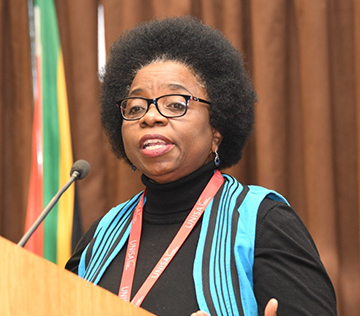News & Events
Poor socioeconomic status makes women vulnerable
With mounting socioeconomic challenges in South Africa, women continue to be on the receiving end post-COVID-19. In this context, Professor Meahabo Magano, Chairperson of the Unisa Women’s Forum, asserts that the current socioeconomic status of the country is not favourable for women, especially the unemployed and the elderly groups.

Professor Meahabo Magano
Magano says: “These groups and low-income earners are challenged by the brunt of unemployment, and one cannot turn a blind eye to the hardships that these women experience on a daily basis.” She adds: “The challenges that these women experience make them vulnerable and impact their wellbeing. They worry about how their families’ basic needs will be provided for.”
To emancipate and empower women, Magano proposes that they should receive training on the skills they possess and use them to empower other women. “An asset-based approach should be used by focusing on unemployed women and what they have interest in,” she says. “Through their basic skills,” Magano continues, “women can generate income for their families.”
Magano believes that university engagement scholarships can help to instil entrepreneurship and cooperation. She remarks: “Women entrepreneurs may end up employing other women and transferring their skills to them. This would be a good practice in communities where women empower one another.”
Magano is concerned about the impact that issues such as accelerating gender-based violence (GBV) and femicide rates, as well as unemployment have on women. She says that unemployment turns women into beggars and reduces their self-esteem and dignity. She maintains that in some GBV and femicide cases, women victims are financially dependent on their perpetrators that they go back to them after being abused. “It is unacceptable that a human being treats another as an object. It is unthinkable that these unpleasant and unlawful acts against women have spread,” Magano reiterates.
Magano affirms that everyone has a reason of existence, therefore, their dreams can be fulfilled. She encourages women to find their purpose and identify their potentials. She further encourages those who were unable to progress educationally to attend the Adult Basic Education Training classes for basic reading, writing and numeracy, and they can go up to matric to upgrade their studies. “Alternatively,” Magano adds, “there is always a skill to uncover or that can be learnt by those who are unable to go back to school irrespective of age. This may be where their wealth is hidden.”
In conclusion, Magano affirms that through hard work and dedication, unemployed women can become problem-solvers for communities that are dependent on handouts.
* By Simphiwe Mthimunye, Unisa student
Publish date: 2022/09/08
